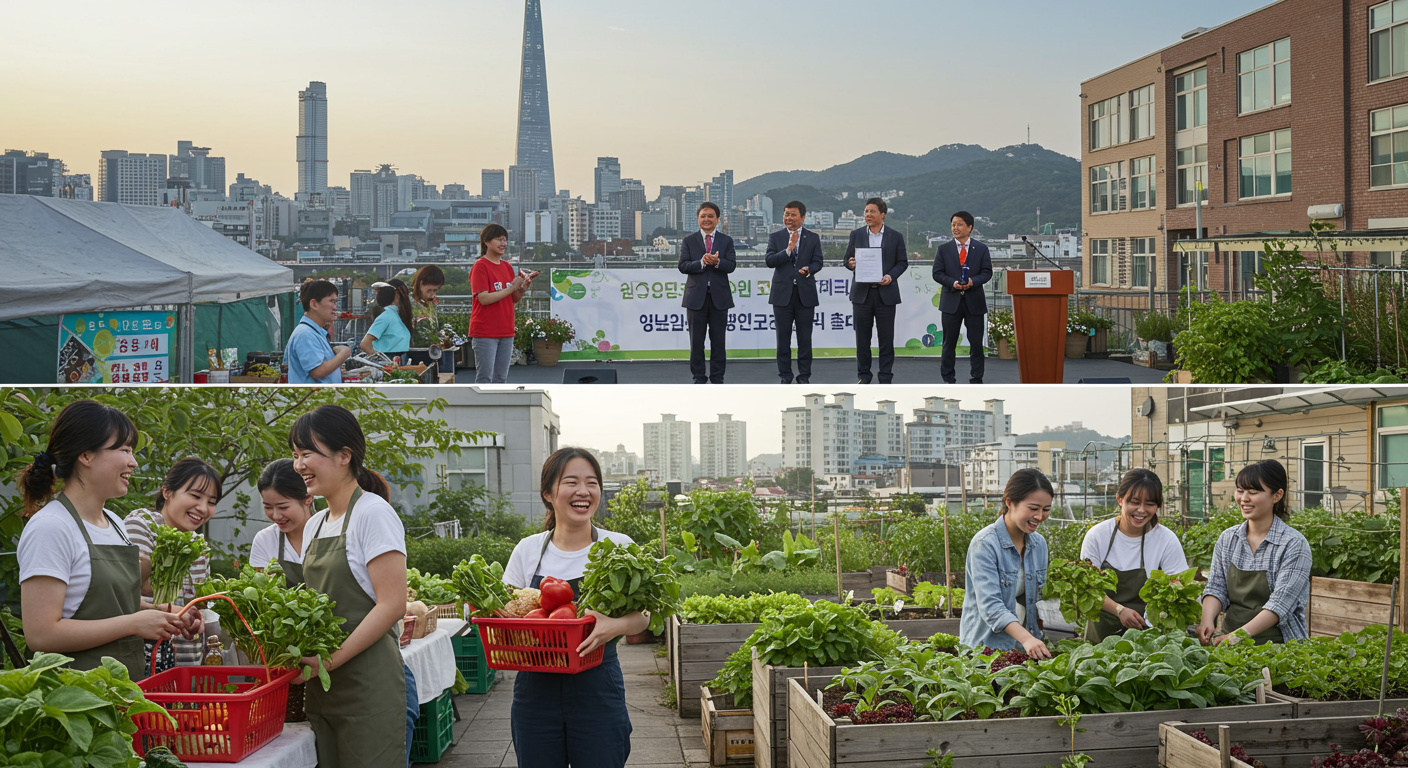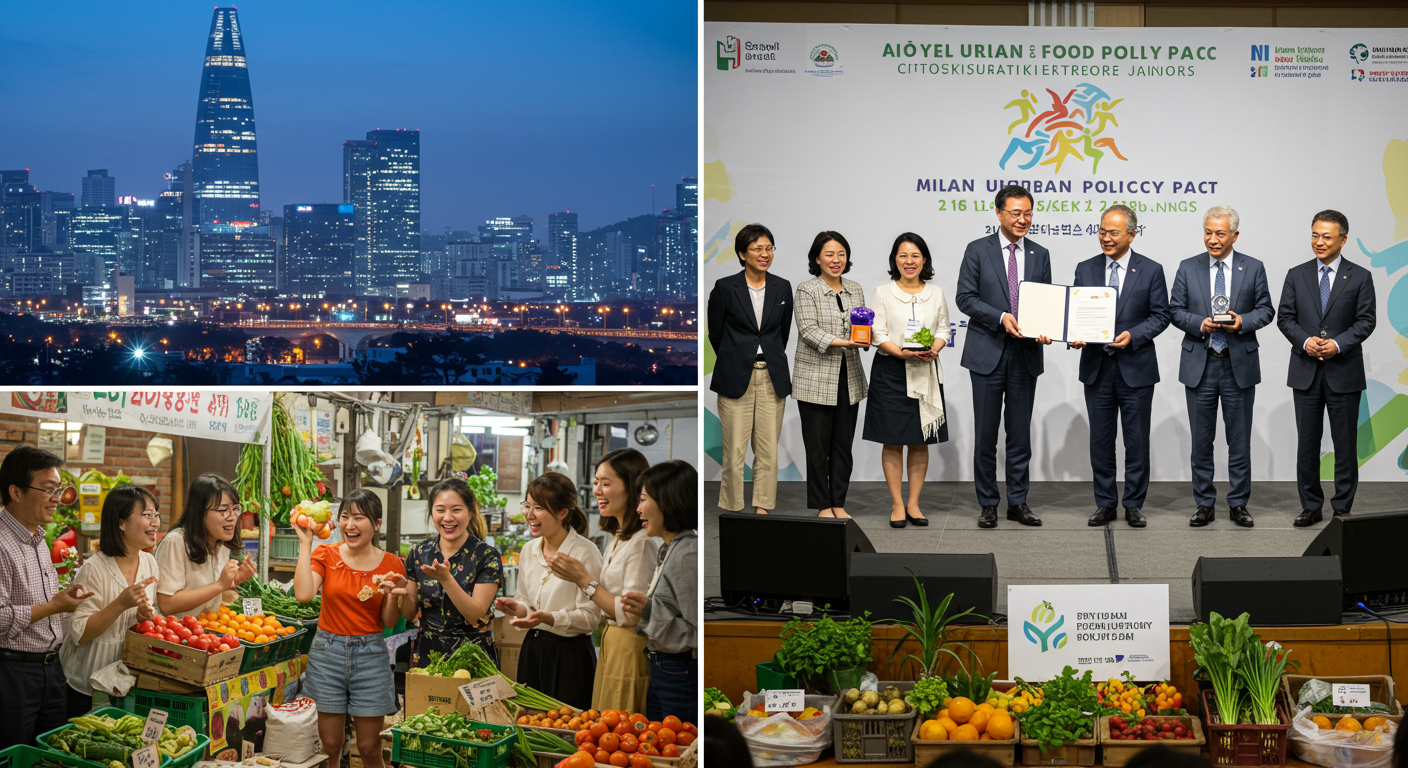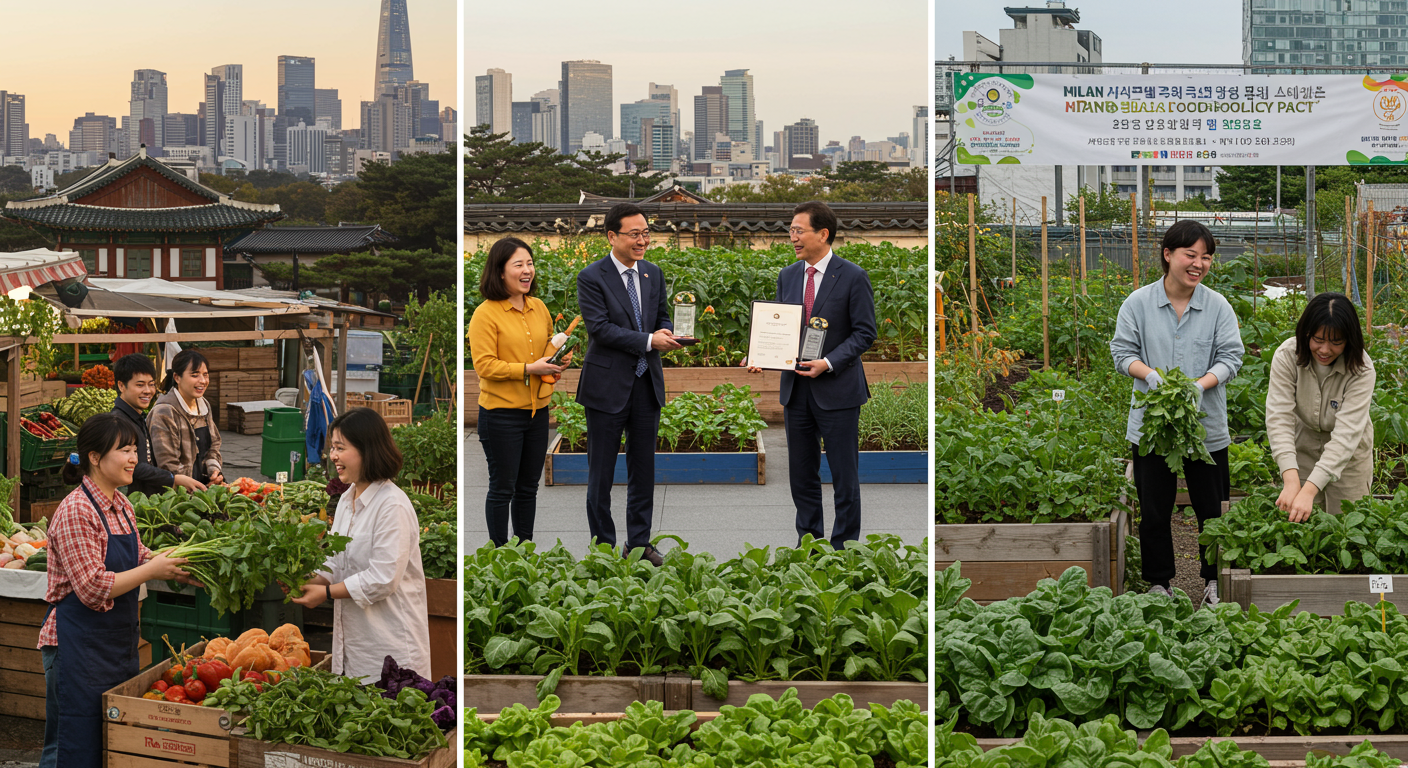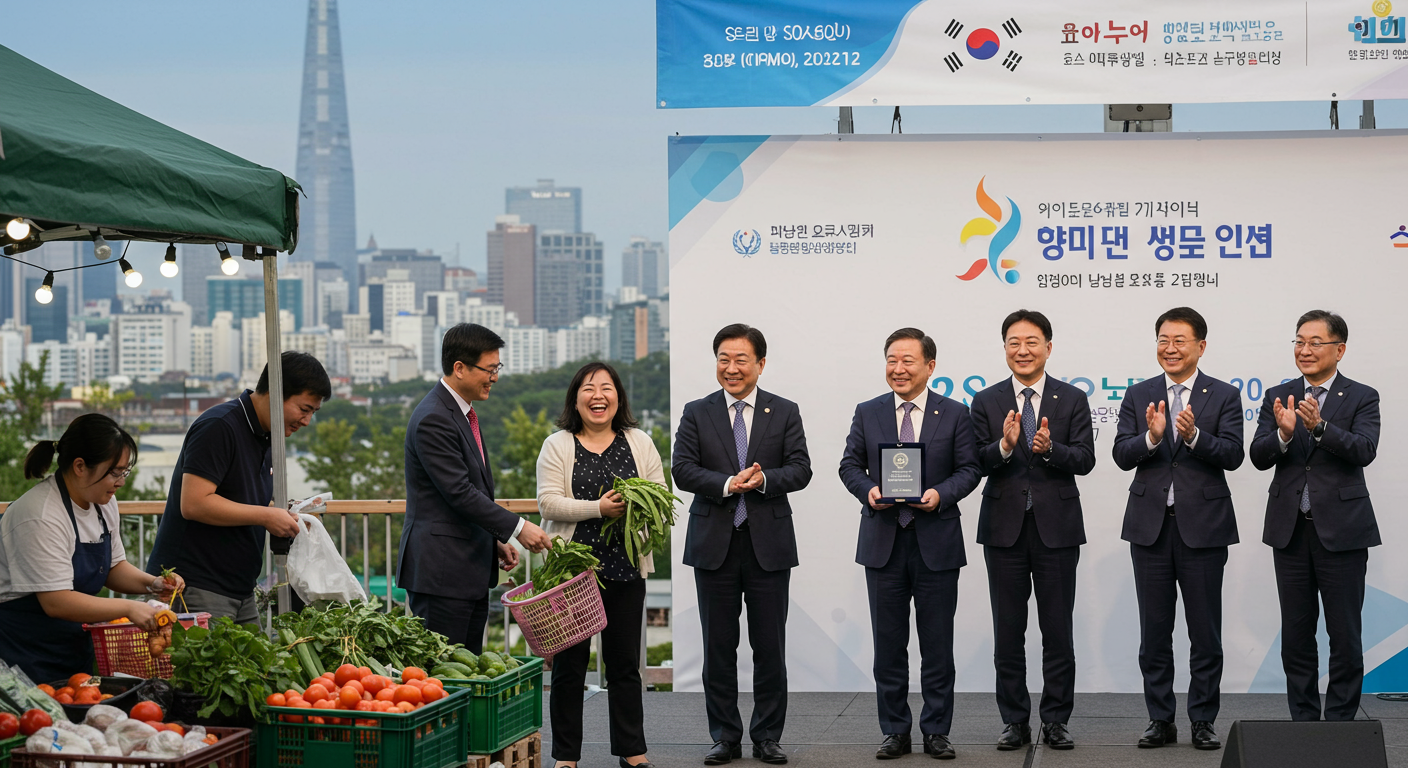Seoul's Recipe for a Sustainable Future: An Award-Winning Urban Food Policy
Seoul's Recipe for a Sustainable Future: An Award-Winning Urban Food Policy
Ever wondered how a sprawling metropolis like Seoul keeps its millions fed, all while pushing for sustainability and food security? It's a monumental challenge, right?
Well, I just heard some fantastic news that truly highlights how innovative city governance can be! The Seoul Metropolitan Government recently clinched a prestigious honor at the 10th Global Forum of the Milan Urban Food Policy Pact (MUFPP) awards. It’s not just about winning an award; it’s about what this signifies for the future of urban living and how cities can truly nourish their residents, both literally and figuratively. As someone who's watched cities evolve for decades, seeing Seoul recognized on such a global stage for its food policies really excites me. Let's dive into what makes Seoul's approach so special and what we can learn from it.
Table of Contents
 Description : "An illustration of the Seoul cityscape at dusk, featuring modern skyscrapers and traditional Korean architecture. In the foreground, people are enjoying a vibrant community food market, showing fresh produce and smiling faces. The atmosphere is warm and inviting."
Description : "An illustration of the Seoul cityscape at dusk, featuring modern skyscrapers and traditional Korean architecture. In the foreground, people are enjoying a vibrant community food market, showing fresh produce and smiling faces. The atmosphere is warm and inviting."
Seoul's Global Triumph: The Milan Urban Food Policy Pact
The Milan Urban Food Policy Pact (MUFPP) isn't just another international agreement; it's a global movement of cities dedicated to developing sustainable, equitable, and resilient food systems. Imagine over 200 cities worldwide, from Rome to Rio, collaborating on how to feed their populations without depleting resources or leaving anyone behind. That's the MUFPP! For a city like Seoul, a bustling hub with over 9 million residents, being recognized at its 10th annual awards is a huge deal. It tells us that Seoul isn't just participating; it's leading the way in tackling some of the most complex challenges facing urban food systems today. I mean, after decades of seeing cities struggle with basic infrastructure, witnessing this kind of sophisticated, holistic approach to food is truly inspiring.
 Description : "A candid photograph of diverse city representatives from around the world, including a visibly proud Korean delegate, shaking hands and smiling warmly on a stage. They are holding a certificate or a small trophy, with a 'Milan Urban Food Policy Pact' banner in the background. The scene conveys achievement and international collaboration."
Description : "A candid photograph of diverse city representatives from around the world, including a visibly proud Korean delegate, shaking hands and smiling warmly on a stage. They are holding a certificate or a small trophy, with a 'Milan Urban Food Policy Pact' banner in the background. The scene conveys achievement and international collaboration."
More Than Just Food: Understanding Seoul's Innovative Strategies
So, what exactly did Seoul do to earn this global nod? It wasn't a single magical bullet, I can tell you that. From what I’ve gathered, Seoul's urban food policy is a comprehensive, multi-faceted gem that touches on everything from farm to fork, and even beyond to waste management. They've really thought about the entire ecosystem, not just isolated parts. This kind of holistic thinking is exactly what we need to see more of in urban planning. It's about recognizing that food isn't just sustenance; it's intricately linked to health, environment, economy, and community well-being.
To give you a clearer picture, here's a quick look at some key areas where Seoul has likely excelled:
| Policy Area | Seoul's Potential Initiatives | Impact |
|---|---|---|
| Food Waste Reduction | Mandatory food waste disposal systems, composting programs, educational campaigns. | Reduced landfill burden, lower greenhouse gas emissions, resource recovery. |
| Urban Agriculture & Local Food | Support for rooftop gardens, community farms, farmers' markets, "farm-to-school" programs. | Increased local food access, green spaces, community engagement, reduced food miles. |
| Food Security & Equity | Subsidized healthy meals for vulnerable groups, food banks, community kitchens. | Improved nutrition for all citizens, reduced social inequality, stronger social safety net. |
 Description : "A realistic photo of an urban rooftop garden in Seoul, with various vegetables and herbs growing in raised beds. Several young adults in casual clothes are tending to the plants, laughing and interacting. The background shows apartment buildings, symbolizing urban sustainability."
Description : "A realistic photo of an urban rooftop garden in Seoul, with various vegetables and herbs growing in raised beds. Several young adults in casual clothes are tending to the plants, laughing and interacting. The background shows apartment buildings, symbolizing urban sustainability."
The Core Ingredients: Key Pillars of Seoul's Food Policy Success
Honestly, it takes a lot more than just good intentions to make policies like this work in a city as dynamic as Seoul. From my vantage point, the real secret sauce here is a blend of strong political will, active citizen participation, and a genuine commitment to innovation. I mean, you can write policies all day long, but if people don't buy into them, or if the government isn't truly pushing them, they're just words on paper. Seoul seems to have cracked that code.
Here are some of the key pillars that I believe underscore Seoul's success:
- Data-Driven Decisions: They're not just guessing! Seoul likely uses robust data collection and analysis to understand food consumption patterns, waste generation, and areas of food insecurity. This allows them to tailor policies for maximum impact.
- Community Engagement: From encouraging urban farming cooperatives to running public education campaigns on food waste, getting citizens involved is crucial. When people feel a part of the solution, they're more likely to adopt sustainable practices.
- Technological Adoption: Given Seoul's reputation as a tech-forward city, it's highly probable they leverage technology. Think smart waste management systems, apps for connecting food surplus with those in need, or even AI-driven agricultural solutions in urban farms.
- Policy Integration: Instead of creating siloed initiatives, Seoul's food policy seems to be integrated across various government departments – environment, health, welfare, urban planning. This ensures a coherent and powerful approach.
 Description : "A close-up, vibrant photo of various fresh, locally sourced Korean ingredients like kimchi, gochujang, and various vegetables artfully arranged on a wooden table. A pair of hands, possibly a chef's, is delicately preparing a dish. The style is bright and appetizing, emphasizing local food systems."
Description : "A close-up, vibrant photo of various fresh, locally sourced Korean ingredients like kimchi, gochujang, and various vegetables artfully arranged on a wooden table. A pair of hands, possibly a chef's, is delicately preparing a dish. The style is bright and appetizing, emphasizing local food systems."
A Taste of the Future: The Impact and Lessons Learned
The recognition Seoul received isn't just a pat on the back; it's a testament to the tangible benefits these policies bring. We're talking about a healthier populace, a cleaner environment, and a more resilient local economy. My experience tells me that when cities get this right, it creates a ripple effect, improving the quality of life for everyone. Other cities, both large and small, really ought to take notes from Seoul's playbook. They’ve shown that even in a dense urban environment, it’s absolutely possible to foster sustainable food practices.
One big lesson for other cities? Don't be afraid to think big and integrate. Food policy can't exist in a vacuum. It needs to be connected to environmental goals, public health initiatives, and economic development strategies. That's how you create real, lasting change. And let's not forget the power of public engagement – it’s a non-negotiable for success in any large-scale urban initiative.
What's Next for Urban Food Systems?
Looking ahead, I believe we're going to see even more innovation in urban food policies globally. The climate crisis, growing populations, and increasing awareness of health and nutrition mean that cities simply *have* to prioritize this. What Seoul is doing today could very well be the standard for tomorrow's smart, sustainable cities. I’m excited to see how they continue to evolve, perhaps leveraging more advanced AI for predictive food waste management or developing even more sophisticated vertical farms. The future of urban living, after all, depends on how well we feed ourselves sustainably. It's a journey, not a destination, and Seoul is clearly on the right path.
The MUFPP is a commitment by over 200 cities worldwide to develop sustainable and equitable urban food systems. It's important because it encourages global collaboration and knowledge sharing to tackle critical issues like food security, waste reduction, and environmental sustainability in urban environments, fostering a healthier future for city dwellers.
Seoul's award for its urban food policy signifies tangible improvements for its residents. These policies lead to benefits like reduced food waste, better access to fresh and local produce, enhanced food security for vulnerable populations, and a greener, more sustainable urban environment. Ultimately, it means a higher quality of life and a healthier city for everyone.
Urban agriculture involves growing food within city boundaries, such as rooftop gardens, community plots, or vertical farms. Seoul might be promoting it to increase local food production, create green spaces, reduce "food miles" (the distance food travels), and foster community engagement, providing fresh produce closer to consumers.
Other cities can learn from Seoul's integrated approach, which combines strong political will, active community engagement, and data-driven technological solutions. Emphasizing inter-departmental collaboration, investing in public education, and supporting local food systems are crucial steps, alongside continuous monitoring and adaptation to local needs.
Comments
Post a Comment